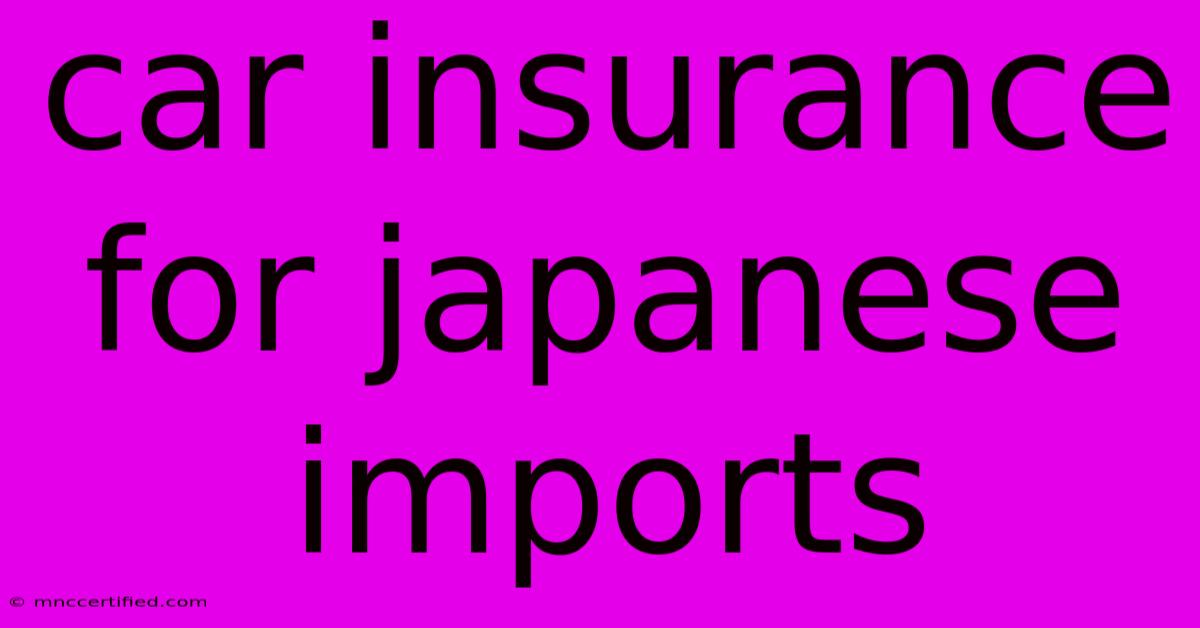Car Insurance For Japanese Imports

Table of Contents
Navigating the Ins and Outs of Car Insurance for Japanese Imports
Importing a Japanese car can be an exciting experience, offering access to unique models and often, better value for money. However, securing the right car insurance is crucial before you even think about hitting the road. This guide delves into the specifics of insuring Japanese imports, highlighting key considerations and helping you find the best coverage for your needs.
Why Insuring Japanese Imports Can Be Different
While the fundamentals of car insurance remain the same, insuring a Japanese import presents unique challenges:
-
Vehicle Identification: Insurers need to verify the vehicle's identity and specifications. This can be more complex with Japanese imports due to differences in documentation and sometimes, less readily available information compared to domestically sold vehicles. Expect to provide comprehensive documentation, including the import certificate and original Japanese registration papers.
-
Parts Availability: Repairing a Japanese import might require sourcing parts from specialist suppliers, potentially leading to higher repair costs. Insurers will consider this when assessing your premium. Clearly, availability of parts is a significant factor.
-
Modifications: Many imported cars have modifications not originally intended for the target market. Insurers scrutinize these modifications, as they can affect the car's value and safety, potentially leading to higher premiums or even policy refusal if the modifications are deemed unsafe. Modified car insurance is a niche area requiring careful attention to detail.
-
Valuation: Accurately valuing a Japanese import can be tricky due to their unique specifications and limited market data compared to mainstream vehicles. This accurate vehicle valuation is vital for determining the appropriate level of coverage.
Finding the Right Car Insurance for Your Japanese Import
Securing the right car insurance requires meticulous research and preparation. Here’s what you need to do:
1. Gather Your Documents
Before contacting insurers, gather all relevant documentation, including:
- Import Certificate: Proof that the vehicle was legally imported.
- Japanese Registration Papers: Original documentation from Japan.
- Bill of Sale: Proof of purchase.
- Vehicle Identification Number (VIN): Essential for identifying the car.
- Proof of Address: To confirm your residence.
- Driving License: Valid driving license.
2. Shop Around and Compare Quotes
Don't settle for the first quote you receive. Compare car insurance quotes from multiple insurers specializing in niche or imported vehicles. This is key to finding the best value for money. Look beyond the premium price and examine the coverage details carefully.
3. Understand Your Coverage Options
Familiarize yourself with different coverage options:
- Third-Party Liability: Covers damages to other vehicles and injuries to other people. This is the minimum requirement in most jurisdictions, but you should seriously consider broader coverage.
- Comprehensive: This covers damages to your own vehicle, including theft and accidental damage, in addition to third-party liability. This is highly recommended for Japanese imports due to the potential higher repair costs.
- Collision: Covers damage to your vehicle in a collision, regardless of who is at fault. Consider this if you frequently drive in congested areas.
4. Disclose All Modifications
Full disclosure is crucial. Don’t try to hide any modifications. Failing to do so could invalidate your insurance policy and leave you liable for any accidents.
5. Check for Specialist Insurers
Some insurers specialize in insuring imported vehicles, possessing a greater understanding of the unique challenges involved. These insurers are often best equipped to provide appropriate coverage and competitive premiums. Japanese car insurance specialists can be invaluable.
Keeping Your Insurance Up-to-Date
Remember to inform your insurer of any changes affecting your vehicle, such as modifications or changes to your address. Regularly review your policy to ensure it continues to meet your needs and provides adequate coverage.
By following these steps, you can confidently navigate the process of insuring your Japanese import and enjoy the thrill of driving your unique vehicle with peace of mind. Remember, doing your homework and preparing thoroughly will save you time, money, and potential headaches down the road.

Thank you for visiting our website wich cover about Car Insurance For Japanese Imports. We hope the information provided has been useful to you. Feel free to contact us if you have any questions or need further assistance. See you next time and dont miss to bookmark.
Featured Posts
-
How Are Insurance Companies Valued
Nov 17, 2024
-
How To Get Insurance License In Ct
Nov 17, 2024
-
Comedian Jon Kenny Dead At 66
Nov 17, 2024
-
Ronaldo On Man Utd Manager After Amorim
Nov 17, 2024
-
Does Home Insurance Cover Asbestos
Nov 17, 2024